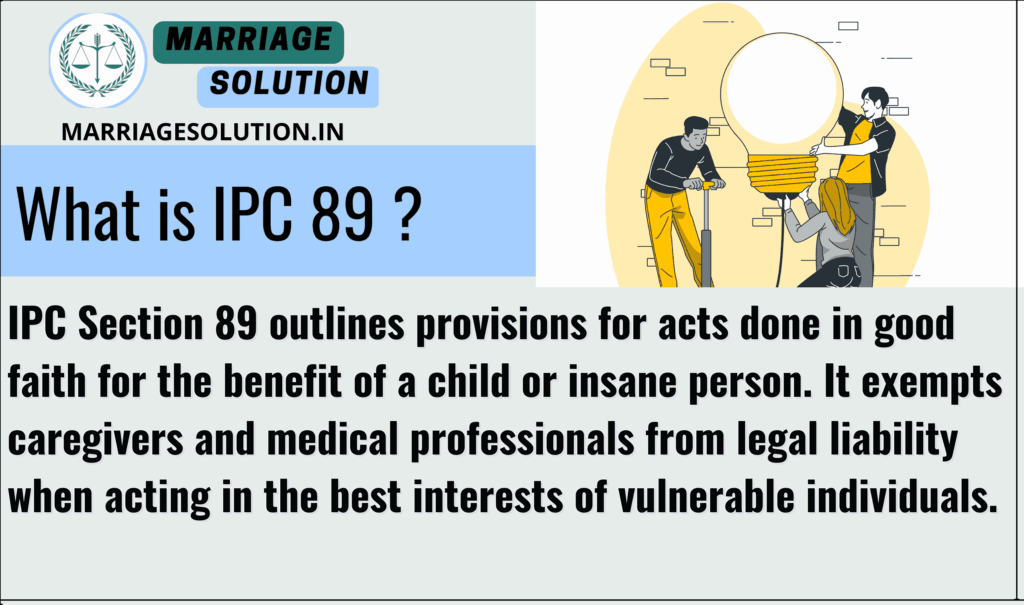Introduction of IPC 89
IPC Section 89 provides legal protection to individuals who act in good faith for the benefit of a child or insane person. It ensures that actions taken with genuine intentions for their welfare are not deemed criminal offenses under the law.
What is IPC Section 89 ?
IPC Section 89 outlines provisions for acts done in good faith for the benefit of a child or insane person. It exempts caregivers and medical professionals from legal liability when acting in the best interests of vulnerable individuals.

IPC Section 89 Overview
IPC Section 89 protects caregivers and medical professionals from legal responsibility when they act in good faith for the well-being of children or mentally ill individuals.
Key Points of IPC Section 89
- Protection of Children and Insane Persons
- IPC Section 89 safeguards individuals who act in good faith for the benefit of a child or insane person.
- It ensures that actions taken with good intentions for their welfare are not punished under the law.
- Legal Safeguards for Caregivers
- The section provides legal protection to caregivers, guardians, or medical professionals who act in the best interests of children or mentally incapacitated individuals.
- It encourages responsible caregiving without fear of legal consequences.
- Criteria of Good Faith
- Actions must be performed genuinely with the intention of benefiting the child or insane person.
- Good faith implies honest belief and absence of malice or wrongful intent.
- Extent of Protection
- IPC 89 covers a wide range of actions, including medical treatment, restraint, and confinement, if done in the best interest of the child or insane person.
- It ensures that caregivers can make necessary decisions for their wards’ welfare without legal repercussions.
- Legal Boundaries
- Despite the protection provided, the section does not justify actions that result in unnecessary harm or suffering to the child or insane person.
- Caregivers must adhere to ethical and legal standards while exercising their authority.
- Balancing Welfare and Legal Accountability
- IPC 89 strikes a balance between the welfare of vulnerable individuals and accountability for caregivers’ actions.
- It acknowledges the complexity of caregiving situations and offers legal clarity in such contexts.
IPC 89 Punishment
No Punishment for Acts in Good Faith:
- IPC 89 exempts individuals from punishment when their actions are done in good faith for the benefit of a child or insane person.
- It protects caregivers and medical professionals from legal repercussions for actions taken in the genuine interest of their wards.
Criteria of Good Faith:
- Good faith implies honest intentions and absence of malice or wrongful intent.
- Individuals must genuinely believe that their actions are for the welfare of the child or insane person.
Extent of Protection:
- The protection extends to a wide range of actions, including medical treatment, restraint, and confinement, if performed in good faith.
- Caregivers are shielded from legal liability as long as their actions are motivated by genuine concern for the welfare of the vulnerable individual.
89 IPC bailable or not ?
IPC Section 89 does not specifically address bailable or non-bailable offenses. However, since it provides legal protection for acts done in good faith, individuals invoking this section are likely to be granted bail if arrested, pending further legal proceedings. The focus is on the intention and benefit to the child or insane person rather than punitive measures against the caregiver.
Section 89 IPC in short information
| Offence | Definition | Punishment | Bailable or Not |
|---|---|---|---|
| Act done in Good Faith for Benefit of Child or Insane Person | Protects individuals acting in good faith for the welfare of a child or insane person from legal liability. | No punishment for acts in good faith | Likely bailable, depending on circumstances |
IPC 89 FAQs
What is IPC Section 89?
IPC Section 89 protects individuals acting in good faith for the benefit of a child or insane person from legal liability.
Who does IPC 89 apply to?
IPC 89 applies to caregivers, guardians, or medical professionals responsible for the welfare of children or mentally incapacitated individuals.
What constitutes “good faith” under IPC 89?
Good faith implies honest intentions and actions taken without malice or wrongful intent.
If you need support with court proceedings or any other legal matters, don’t hesitate to reach out for assistance.
Court or any other marriage-related issues, our https://marriagesolution.in/lawyer-help-1/ website may prove helpful. By completing our enquiry form and submitting it online, we can provide customized guidance to navigate through the process effectively. Don’t hesitate to contact us for personalized solutions; we are here to assist you whenever necessary!
